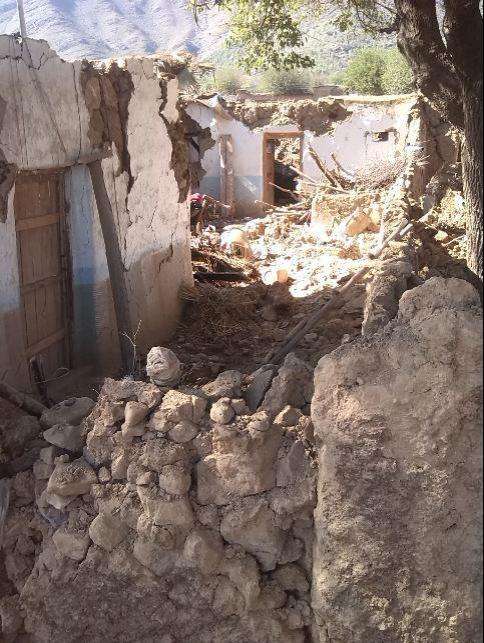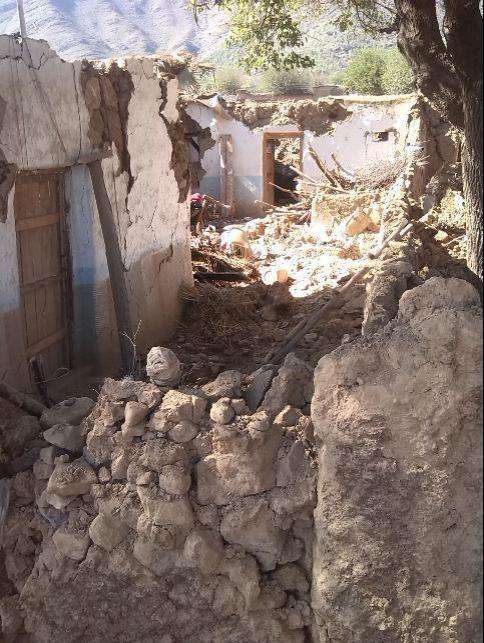An earthquake recorded between 7.6 and 8.1 on the Richter scale rocked parts of northeastern Afghanistan and northwestern Pakistan on the afternoon of October 26. Doctors Without Borders/Médecins Sans Frontières (MSF) medical projects in northwestern Pakistan were faced with an initial influx of seriously wounded in the first hours. After treating the injured, the next priority is to assess the needs and identify if there are any urgent follow-up requirements.
In Timergara, in the Lower Dir District of Khyber Pakhtunkhwa Province, a mass-casualty plan was almost immediately set in motion, with all staff following specific protocols for triage and lifesaving care for severely wounded patients. From 3:00 p.m. on Monday afternoon to 8:00 a.m. on Tuesday morning, the MSF medical team running the Emergency Room in Timergara Hospital saw 172 patients, including 55 who were in critical condition and one who could not be saved.
MSF is also assisting Ministry of Health staff to provide after-care to the more seriously injured patients who were initially stabilized and treated in the ER department. A dengue fever ward that MSF runs in the hospital has been temporarily turned into an additional inpatient ward to cope with the number of patients. MSF is also focusing on ensuring that sterilization services can be boosted to cover the increased needs 24 hours a day.
Seventy-two patients were treated on Monday in Khar Hospital, in Bajaur Agency of the Federally Administered Tribal Areas (FATA), with the help of an MSF team from nearby Nagawai town. MSF has an agreement to provide support in FATA when there are mass-casualty events. The quake was felt as far away as Peshawar, where MSF has run a hospital since May 2011.
In Afghanistan, none of MSF’s teams have reported earthquake-related needs, though it is too early to say for certain whether a response is required in areas closer to the epicenter, in Badakhshan. MSF is present in several locations across Afghanistan. Teams are still currently assessing the damages and needs in the wake of yesterday's earthquake. Some locations are remote and sparsely populated, so the overall needs are still unclear to MSF. Currently, no emergency intervention is foreseen.
With the initial influx of patients now over, the priority for MSF teams is now to get a clear picture of any further response that might be needed—such as hygiene or shelter kits, or follow-up medical care. To this end, MSF teams are collecting information about the needs in areas where there are reports of earthquake consequences.
“While the initial effects of the earthquake were dramatic in some areas, we need to fill in some parts of the picture before we can give detailed indications of further needs,” says Shelagh Woods, MSF country representative in Pakistan. “Initial assessments suggest that shelter and hygiene will be most likely the main needs, as it is already snowing in some of the more mountainous areas, and we have stocks of shelter and hygiene kits ready. Our mass casualty responses were essential to save lives during the first hours, but now we need to rapidly finish some post-earthquake needs assessments, before moving to the second stage of our response.”
Since 1986, MSF has been working with Pakistani communities and Afghan refugees who are victims of armed conflict and natural disasters, or who lack access to medical care. MSF teams are currently providing free emergency medical care in Kurram and Bajaur Agency (FATA), Khyber Pakhtunkhwa, Balochistan, and Sindh provinces. MSF is an international private medical association, reliant on private financial contributions from individuals around the world, and does not accept funding from any government, military, or politically affiliated group for its work in Pakistan or Afghanistan.





